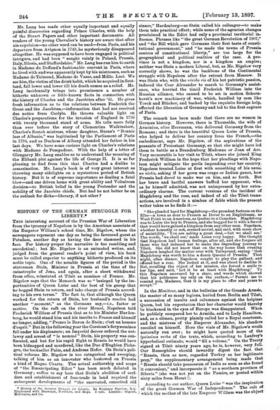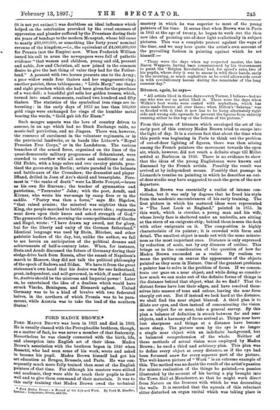HISTORY OF THE GERMAN STRUGGLE FOR LIBERTY.* THIS interesting account
of the Prussian War of Liberation from the tyranny of Napoleon is by the American associate of the Emperor William's school time, Mr. Bigelow, whom the newspapers represent one day as being the favoured guest at Potsdam, another day as having the door slammed in his face. For history proper the narrative is too rambling and auecdotical ; but Mr. Bigelow is an animated writer, and, judged from the general reader's point of view, his book must be called superior to anything hitherto produced on its noble topic. One of the notable figures of the period is the statesman Stein, Minister in Prussia at the time of the catastrophe of Jena, and again, after a short withdrawal from office, reinstated at Tilsit as nominee of France. Mr. Bigelow says that the Monarch was so "besieged by the im- portunities of Queen Luise and the best of his group that he begged Stein to return, and take charge of Prussia accord- ing to his own terms." The fact is, that although the Queen worked for the return of Stein, her husband's resolve had another "moment," as the Germans say,—i.e., factor or motive. On the raft on the river Meme], Napoleon told Frederick William of Prussia that as to his Minister Har berg, he would stand him and his insults to France and himself no longer, adding, " Prenez le Baron de Stein; c'est un homme il'esprit." But in the following year the Corsican's fiery nominee fell under his displeasure; an Imperial decree ordered the out- lawry and arrest of "le nomme " Stein, his property was con- fiscated, and but for his rapid flight to Russia he would have been kidnapped and murdered, like the Duo d'Enghien Plebe- gm, the bookseller Palm, and Andreas Hofer. On Stein's poli- tical reforms Mr. Bigelow is too categorical and sweeping, talking of him as an innovator who bestowed on Prussia a kind of Magna Charta. The actual authorship and scope of "the Emancipating Edict" has been much debated in Germany ; suffice to say here that Stein's abolition of serf- dom and establishment of free-trade in land required the subsequent developments of "the enervated, conceited old
• History of the German Struylle for Liberty. BY Ponitney Ricalow, 13.A• Illnatrated with Drawings, Portrals, and Maps. 2 vols. London : Osgood, MoIlvaino, and Co.
sinner," Hardenberg—so Stein called his colleague—to make them take practical effect; while some of the agrarian changes proclaimed in the Edict had only a provincial territorial in- fluence. Phrases like "the great German Revolution of 1807," and "the Bill which gave Germans their first taste of consti- tutional government," and "he made the towns of Prussia centres of constitutional liberty," are too large for the geographical and political realities of the case. A. pro-
vince is not a kingdom, nor is a kingdom an empire; neither was Stein a modern Liberal, but, as Mr. Bigelow very correctly shows, he was the backbone of the Continental struggle with Napoleon after the retreat from Moscow. It was Stein who, with the vivida ris of his hot patriotic passion, induced the Czar Alexander to march to Germany's assist- ance, who hurried the timid Frederick William into the
Russian alliance, who caused to be set in motion Scharn- horst's new machinery of war, which, handled by men like Yorck and Bliicher, and backed by the requisite foreign help, effected the liberation of Germany and led to the first capture of Paris.
The remark has been made that there are no women in German history. However, there is Thusnelda, the wife of Arminius, alias Herrmann, who delivered Germany from the Romans; and there is the beautiful Queen Luise of Prussia, who helped to deliver her country from the French,—the embodiment, says Mr. Bigelow, of the aspirations of the peasants of Protestant Germany, so that she might have led them to battle as a Brandenburg Madonna or Joan of Arc. Very memorable is her visit to Tilsit, where she joined King
Frederick William in the hope that her pleadings with Napo- leon might mitigate the perils impending over her country. Napoleon treated Luise at first with something of his usuai va vietis, asking if her gown was crape or Indian gauze, how Prussia had dared to make war on him, and so forth. But her brave and tactful answers baffled her opponent, who
as he himself admitted, was not unimpressed by her extra- ordinary charms. The current versions of the incident of Magdeburg and the rose, and indeed of all the Tilsit trans- actions, are involved in a nimbus of fable which the present writer takes as he finds it :—
" She pleaded hard for Magdeburg—the proudest fortress on the Elbe—a town as dear to Prussia as Dover to an Englishman, as West Point to an American, as Quebec to a Canadian. Magdeburg was to Luise the key to Prussia, and she begged for it with a fervor that would have gained a kingdom from any other man. Napoleon, whether honestly or not, seemed moved, and said, with some show of amiability, You are asking a great deal, —but we shall see.' The words, we shall see,' made Luise very happy. She thought that Napoleon had human feelings, after all, and she forgave all those who had induced her to make the degrading journey to Tilsit. She did not know that on the way home that evening Napoleon laughed the matter over with Talleyrand, saying that Magdeburg was worth to him a dozen Queens of Prussia.' That night, after dinner, Napoleon sought to play the gallant, and offered her a rose. She looked at it, and was about to decline it. But, recalling the object of her mission, she forced a smile to her lips, and said, Let it be at least with Magdeburg.' To this Napoleon answered by a stare, and words which showed that his politeness lay only on the surface,—' Permit me to remind you, Madame, that it is my place to offer and yours to accept."
In the Moniteur, and in the bulletins of the Grande Armee, the master of so many legions, hurled from Berlin and Tilsit, a succession of insults and calumnies against the helpless Queen, but his expectation that her character would thereby be blackened in the eyes of Europe was disappointed. When he publicly compared her to Armida, and to Lady Hamilton, and, as a climax, pretty plainly called her a Royal courtesan, and the mistress of the Emperor Alexander, his elanders recoiled on himself. Here the vials of Mr. Bigelow's wrath naturally run over ; he might have quoted more of the ipsissinia verba of the texts, which, according to Lanfrey's hyperbolical estimate, would "fill a volume." On the Treaty signed at Tilsit ninety years ago, he is, however, very full. Our Russophiles should inwardly digest the fact that "Russia, then as now, regarded Turkey as her legitimate prey," the supplementary arrangement being made that "Russia should take possession of India as soon as she found it convenient," and incorporate it "as a southern province of Siberia" (she was not yet on the Pamirs, or posted within sixty miles from Herat !).
According to our author, Queen Luise "was the inspiration of the great German War of Independence." The cult of
which the mother of the late Emperor William was the object (it is not yet extinct!) was doubtless an ideal influence which helped on the retribution provoked by the cruel excesses of oppression and plunder suffered by the Prussians during their six years of bondage to the modern Meneptah, whose bill came to nearly £80,000,000, or something like forty years' nominal revenue of the kingdom,—i.e., the equivalent of 24,000,000,000 for Prussia (not the Empire) now. When Frederick William issued his call to arms the newspapers were full of pathetic evidence "that women and children, young and old, peasant and noble, Jew and Christian, all now joined in the common desire to give the last thing of value they had for the Father- land." A peasant with two horses presents one to the Army ; a poor widow sends four thalers and her engagement-ring ; another patriot, three tablespoons ; "Little Mary," one thaler and eight groschen which she had been given for the purchase of a wax-doll ; a beautiful girl sells her golden tresses, which, turned into small ornaments, realised two hundred and fifty thalers. The statistics of the symbolical iron rings are in- teresting: in the early days of 1813 no lees than 160,000 gold rings were exchanged for rings of the humbler metal bearing the words, "Gold gab ich fiir Eisen."
Such meagre aspects was the love of country driven to assume, in an age which had no Stock Exchange raids, no music-hall patriotism, and no Jingoes. There was, however, the resource of enrolment in the volunteer regiments, or in the provincial landwehr, or in bands like Liitzow's "Royal Prussian Free Corps," or in the Landsturm. The various branches of the armed force, organised on the lines of the quasi-democratic military programme of Scharnhorst, were crowded to overflow with all sorts and conditions of men. Old Fichte, with a huge sabre and two cavalry pistols, prac- tised the goose-step in Berlin ; artists paraded in the helmets and battle-axes of the Crusaders; the dramatist and player Ifliand, drilled in Joan of Arc's shield and breastplate. Fore- most in "the ranks of death" were La Motto Fouque,—brave as his own Sir Sintram ; the teacher of gymnastics and patriotism, " Turnvater" Jahn; with the poet, Arndt, and Korner, who wrote his war-songs by camp fires or in the saddle. "Poetry was then a force," says Mr. Bigelow, "that raised armies; the minstrel was mightier than the King, the people marched to battle for a mere idea ; regiments went down upon their knees and asked strength of God." The gymnastic father, scorning the cosmopolitanism of Goethe and Hegel, wrote : "I have drawn my sword, not for glory, but for the liberty and unity of the German fatherland." Identical language was used by Stein, Bliicher, and other patriotic leaders of the day, but, unlike the author, we fail to see herein an anticipation of the political dreams and achievements of half-a-century later. When, for instance, Stein and Arndt discussed the future of Germany during their sledge-drive back from Russia, after the smash of Napoleon's march to Moscow, they did not talk the political philosophy of the epoch of Sadowa and Sedan. We have it from the great statesman's own hand that his desire was for one fatherland, great, independent, and self-governed, in which, if need should he, Austria should be the mistress and Imperial power ! Later on, he entertained the idea of a dualism which would have struck Vincke, Beningsen, and Bismarck aghast. United Germany was to be a kind of bivalve with two federated halves, in the northern of which Prussia was to be para- mount, while Austria was to take the lead of the southern States!



































 Previous page
Previous page